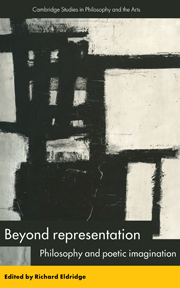Book contents
- Frontmatter
- Contents
- List of contributors
- Editor's acknowledgments
- 1 Introduction: from representation to poiesis
- 2 Confession and forgiveness: Hegel's poetics of action
- 3 The values of articulation: aesthetics after the aesthetic ideology
- 4 In their own voice: philosophical writing and actual experience
- 5 Poetry and truth-conditions
- 6 Fractal contours: chaos and system in the Romantic fragment
- 7 The mind's horizon
- 8 Kant, Hölderlin, and the experience of longing
- 9 Wordsworth and the reception of poetry
- 10 Self-consciousness, social guilt, and Romantic poetry: Coleridge's Ancient Mariner and Wordsworth's Old Pedlar
- 11 Her blood and his mirror: Mary Coleridge, Luce Irigaray, and the female self
- 12 Scene: an exchange of letters
- Index
12 - Scene: an exchange of letters
Published online by Cambridge University Press: 06 July 2010
- Frontmatter
- Contents
- List of contributors
- Editor's acknowledgments
- 1 Introduction: from representation to poiesis
- 2 Confession and forgiveness: Hegel's poetics of action
- 3 The values of articulation: aesthetics after the aesthetic ideology
- 4 In their own voice: philosophical writing and actual experience
- 5 Poetry and truth-conditions
- 6 Fractal contours: chaos and system in the Romantic fragment
- 7 The mind's horizon
- 8 Kant, Hölderlin, and the experience of longing
- 9 Wordsworth and the reception of poetry
- 10 Self-consciousness, social guilt, and Romantic poetry: Coleridge's Ancient Mariner and Wordsworth's Old Pedlar
- 11 Her blood and his mirror: Mary Coleridge, Luce Irigaray, and the female self
- 12 Scene: an exchange of letters
- Index
Summary
Dear Philippe,
Since we have been asked to contribute a work on “the scene” [la scène], I'd like to sieze the occasion to revive a debate which we have broached several times, long ago. I will, then, summarize the theme in the Greek word opsis, which designates, in Aristotle's terms, just about what we call “staging” [mise en scène]. (“Just about”: here already is a problem of translation, and consequently of meaning and nuance. It can also be translated by “performance” [spectacle]. We will be able to return to this problem later.)
The opsis is one of the six “parts” of the tragedy, according to the Poetics (50a), which, “involves everything,” listing the five other parts. A passage to be interpreted delicately, it could simply mean that when there is performance, there is everything else as well, plot, text, etc. (cf. the note of R. Dupont-Roc and J. Lallot; I will note their edition simply with a P). A little further along, when Aristotle details the nature of these parts, he declares that the opsis is on the one hand “seductive” (“psychagogical”, 50bl7), but, on the other hand, foreign to art [atekhnotaton), and not at all in its rightful place in the Poetics. If there is, in this case, tekhnē, it is that of the prop master [skeuopoios), not that of the poiétés. For “the tragedy achieves its finality even without enactment and without actors” (50bl8). Consequently, its entire effect is found only in its reading. (I would remind you, in passing, that this signifies, for a Greek, reading aloud, which implies something quite different from our silent reading.)
- Type
- Chapter
- Information
- Beyond RepresentationPhilosophy and Poetic Imagination, pp. 273 - 302Publisher: Cambridge University PressPrint publication year: 1996
- 9
- Cited by

